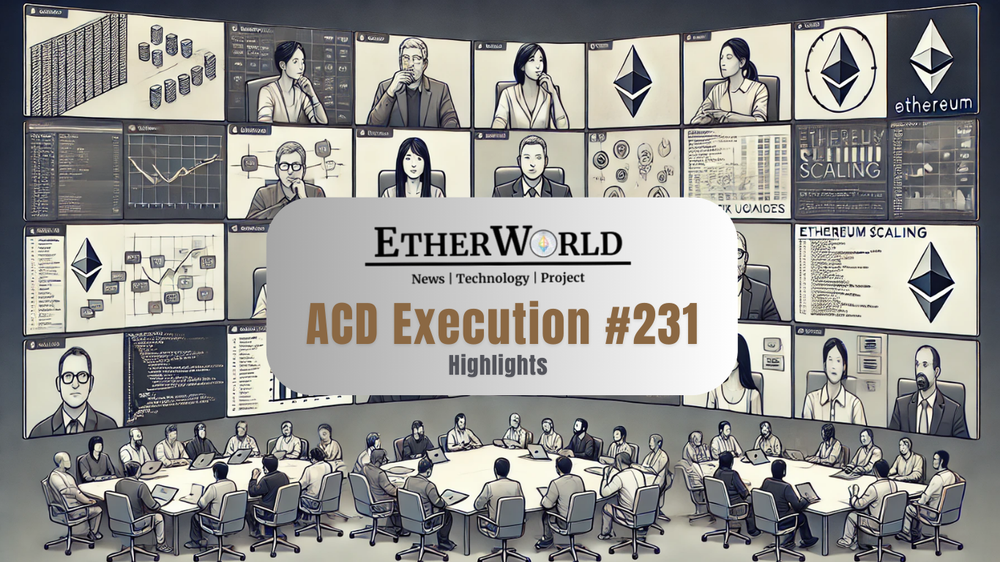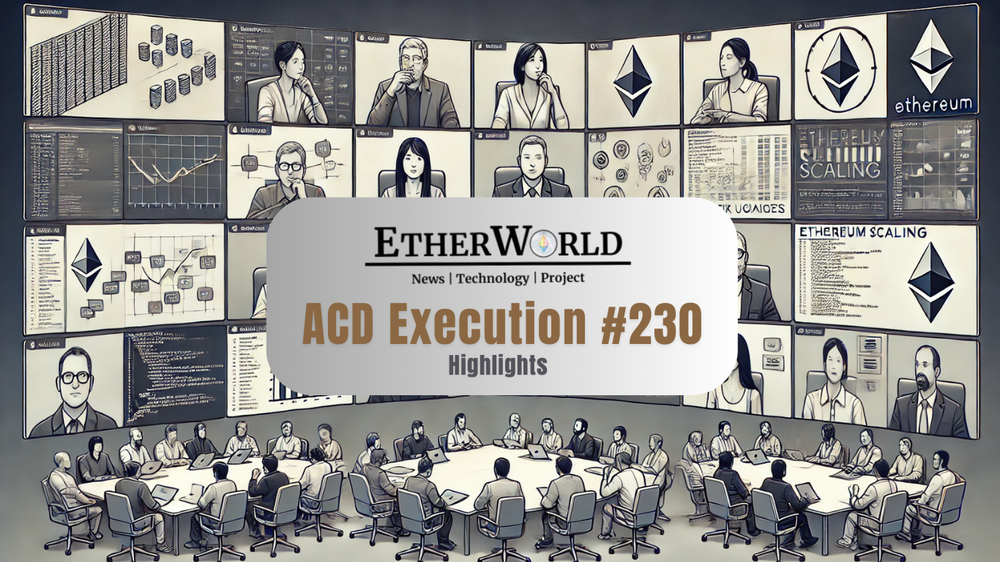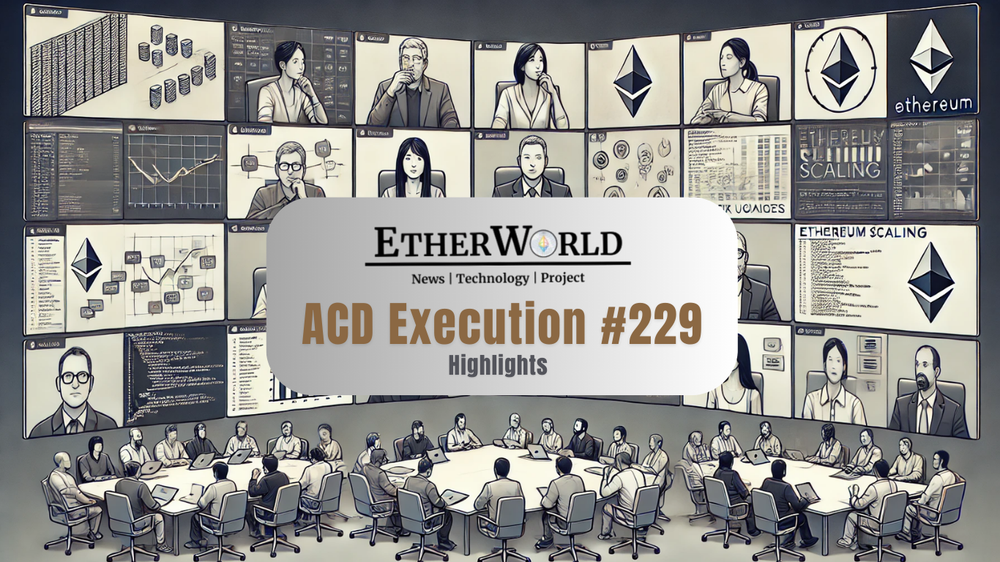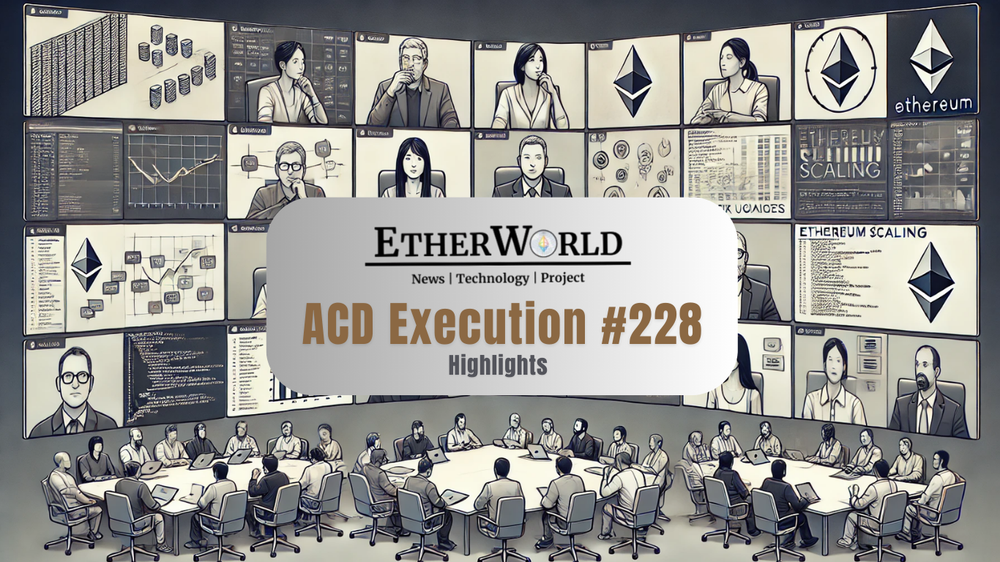Highlights from the All Core Developers Execution (ACDE) Call #221
Ethereum ACDE #221 highlights Fusaka testnet progress, Glamsterdam devnet plans, new EIP proposals & governance shifts shaping the network’s roadmap.
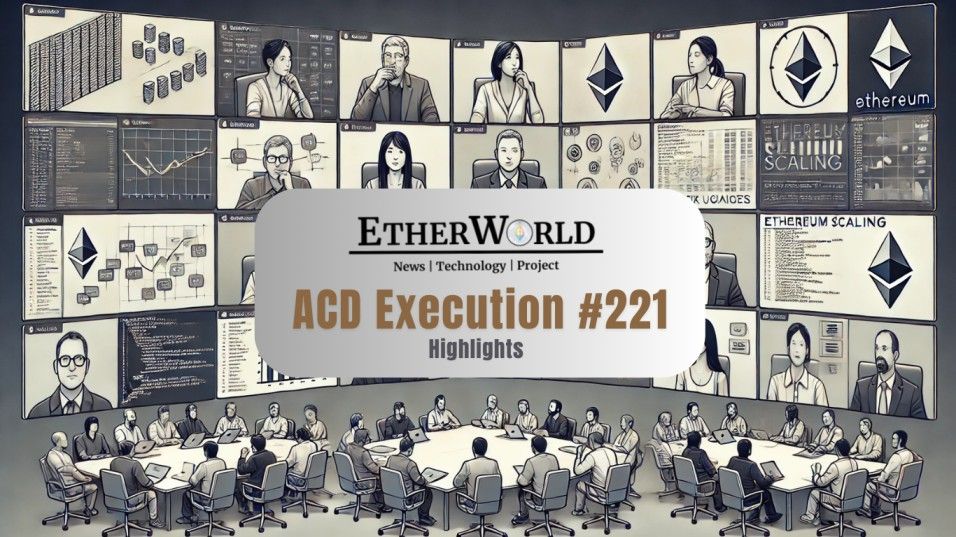
Ethereum’s All Core Developers Execution (ACDE) Call #221 covered critical updates shaping the network’s near-term roadmap. Discussions centered on Fusaka’s stability, blob performance, & the upcoming Holesky, Sepolia, and Hoodi testnet forks.
Developers also reviewed Glamsterdam’s progress, with BAL & ePBS features moving toward October devnets. Beyond upgrades, new EIPs like SETDELEGATE & governance shifts marked the call, reflecting Ethereum’s balance between scalability, security, & long-term sustainability.
Fusaka Updates
The Fusaka bug bounty program is now live, with developers and researchers already submitting reports. Importantly, no catastrophic vulnerabilities have been identified, which means the upgrade timeline remains unchanged and on track for planned testnet and mainnet deployments.
The official source of truth for the Fusaka testnet activation schedule is EIP-7607, which centralizes the release cadence for coordination across the ecosystem. The rollout begins with the Holesky fork on October 1, followed by Sepolia and Hoodi at two-week intervals, provided no major issues are detected along the way.
The Ethereum Foundation’s blog post will also provide an overview once all client releases are confirmed. When Fusaka goes live on mainnet, the default block gas limit will be raised to 60 million, as specified in EIP-7935.
This change will be included in Fusaka mainnet client releases once testnet upgrades are complete. The decision reflects a strategic adjustment to accommodate growing execution demands, especially from L2 rollup settlements, blob transactions, and other scaling use cases.
While this increases throughput capacity, validator governance will continue to play a role in adjusting gas limits over time based on network performance and decentralization considerations. As Fusaka approaches deployment, all relevant EIPs are being advanced to the “Last Call” stage, signaling specification stability.
Authors are expected to review their proposals and update statuses accordingly. The tracking of this transition is being coordinated through a dedicated pull request on GitHub: PR #10423.
Glamsterdam Updates
The Glamsterdam roadmap is progressing along two major tracks: BALs and ePBS (enshrined Proposer-Builder Separation). For BALs, the breakout held on Wednesday discussed several items, including how to handle a precompile.
No major issues were reported, and teams remain on track for the first BAL devnet in October. Contributors were specifically asked to use the bal-devnet-0 branches, indicating that client repositories are already preparing for Devnet-0.
On the ePBS side, progress is equally active. An ePBS breakout is scheduled, and the spec v1.6.0-beta.0 was released the day before the call.
Devnet-0 is expected soon, with core developers inviting feedback in the breakout session. The parallel advancement of BALs toward October devnets and ePBS with a fresh spec release signals strong momentum across both Glamsterdam pillars.
All Core Devs – Execution (ACDE) #221 is Live!
— Pooja Ranjan | ranjan.eth (@poojaranjan19) September 25, 2025
Agenda:
?Fusaka
- Bug bounty
- Testnet releases (Meta EIP)
- 60M mainnet gas limit default
- EIP status updates
?Glamsterdam
- EPBS/BALs
- PFI deadline ?
- Update EIP-7723 (EIP Champion role)
? Livestream:…
Miscellaneous Updates
EIP-7819 proposes a new EVM instruction, SETDELEGATE, which allows smart contracts to create and update delegation accounts that follow the design of EIP-7702. These accounts can function in a manner similar to ERC-1167, but with notable improvements in efficiency and usability.
The motivation behind this proposal is to reduce Ethereum’s state growth problem by encouraging code reuse. Developers and researchers on the ACDE call highlighted that this opcode could significantly cut state growth if widely adopted.
The importance of this is underlined by data showing that about 89.1% of contracts are deployed via factory contracts, which often duplicate code unnecessarily. By shifting these deployments toward delegation-based accounts, Ethereum could reduce redundant bytecode stored on-chain and slow state bloat.
Currently, this proposal is in discussion and research phase, with ongoing evaluation of its design, gas implications, and security considerations. The early signals from core developers suggest strong interest in exploring this further, given its potential to streamline contract creation patterns and reduce storage overhead.
The SETDELEGATE instruction directly complements EIP-7702, which introduced the concept of delegation accounts. With SETDELEGATE, contracts can programmatically create or update these accounts, aligning their behavior with the delegation model envisioned in 7702.
This means developers can replicate the convenience of ERC-1167 minimal proxy clones at the protocol level, but with stronger guarantees and more efficient execution. In practical terms, this could simplify upgradeable contract designs, enable cleaner dispatch logic, and reduce reliance on duplicated proxy bytecode.
For developers, this means lighter deployments, and for the protocol, it means slower state growth. These benefits, however, will need validation through ongoing research and community feedback.
For client teams, the proposal requires careful examination of opcode semantics, gas schedules, and possible edge cases (such as re-entrancy or delegation update flows). These details will determine how easy it is to implement in clients and how secure it will be in practice.
For application developers, the opcode could become a standardized tool for managing clone-like patterns, reducing boilerplate code and improving contract upgrade workflows. At this stage, discussions remain open, and the outcome will depend on broader testing and feedback within the Ethereum ecosystem.
While the broader call recommended temporarily pausing the intake of new EIPs (moving items from CFI → SFI) until Fusaka is shipped, EIP-7819 was highlighted as an exception worth tracking due to its potential impact. Developers discussed how the proposed instruction could address state growth concerns and acknowledged the significance of the factory deployment datapoint, which makes this opcode particularly relevant.
The leadership of ACDE calls is undergoing a transition while Tim Beiko takes a leave. This was Tim’s last ACD before his break and ansgar.eth will take over until the end of the year.
A significant governance discussion focused on formalizing the role of EIP Champions, who are responsible for actively shepherding an EIP through reviews, coordination, and milestones. A dedicated PR has been opened to define this role: EIP Champion PR #10391 .
If you find any issues in this blog or notice any missing information, please feel free to reach out at yash@etherworld.co for clarifications or updates.
Related Articles
Disclaimer: The information contained in this website is for general informational purposes only. The content provided on this website, including articles, blog posts, opinions, & analysis related to blockchain technology & cryptocurrencies, is not intended as financial or investment advice. The website & its content should not be relied upon for making financial decisions. Read full disclaimer & privacy policy.
For Press Releases, project updates & guest posts publishing with us, email contact@etherworld.co.
Subscribe to EtherWorld YouTube channel for ELI5 content.
Share if you like the content. Donate at avarch.eth.
You've something to share with the blockchain community, join us on Discord!

